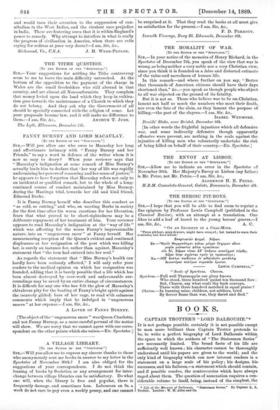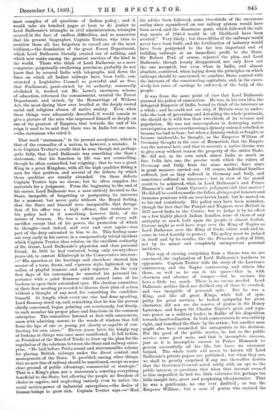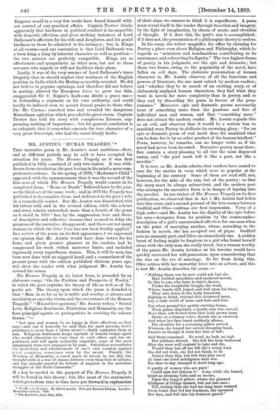BOOKS.
CAPTAIN TROTTER'S " LORD DALHOUSIE."
IT is not perhaps possible, certainly it is not possible except to men more brilliant than Captain Trotter pretends to be, to write a perfect biography of Lord Dalhousie within, the space to which the authors of " The Statesmen Series '' are necessarily limited. The broad facts of his life are sufficiently well known ; his character cannot be thoroughly understood until his papers are given to the world; and the only kind of biography which can now interest readers is a,. statement on a large scale of his policy ; his designs, his, successes, and his failures,—a statement which should contain, and if possible resolve, the controversies which have always. raged about them. The question of annexation requires a con-. siderable .volume to itself, being, instead of the simplest, the
• Life of the Marquis of Dalhousie. " Statesmen Series.* By Captain L. J. Trotter. London : W. H. Allen and Co.
most complex of all questions of Indian policy ; and it would take six hundred pages at least to do justice to Lord Dalhousie's triumphs in civil administration, triumphs secured in the face of endless difficulties, and so numerous that his present biographer, Captain Trotter, who tries to mention them all, has forgotten to record one of the most brilliant, —the foundation of the great Forest Department, which Lord Dalhousie literally created out of nothing, and which now ranks among the greatest services of the kind in the world. Those who think of Lord Dalhousie as a mere conqueror, perpetually swallowing provinces, probably do not know that he covered India with telegraphs, laid down the lines en which all Indian railways have been built, con- structed a Legislative Council so powerful and so free, that Parliament, panic-struck by its audacity, summarily abolished it, worked out Mr. Lowe's enormous scheme of education, reformed the commissariat, created the Forest Department, and struck, by the Remarriage of Widows Act, the most daring blow ever levelled at the deeply rooted social and religious abuses of native society. Even when these things were adequately described, it would remain to give a picture of the man who impressed himself so deeply on one of the greatest of Empires, that towards the end of his reign it used to be said that there was in India but one man, the statesman who ruled it.
That word "statesman," in its present acceptance, which is that of the counsellor of a nation, is, however, a mistake. It is to Captain Trotter's credit that he sees, though not perhaps quite fully, that Lord Dalhousie was something else than a statesman ; that his function in life was not counselling, though he often counselled, but reigning ; that he was a great King in a great Kingdom, with all the high qualities fitting a man for that position, and several of the defects by which those qualities are usually attended. On these defects Captain Trotter lays no stress; but he often supplies the materials for a judgment. From the beginning to the end of his career, Lord Dalhousie was a man entirely devoted to the State, incapable of forgetting or postponing its interests for a moment, but never quite without the Royal feeling, that the State and himself were inseparable, that deroga- tion of his office was a high offence, that resistance to his policy had in it something, however little, of the nature of treason. He was a max capable of every self- sacrifice except that of his power, the protection of which he thought—and, indeed, said over and over again—was part of the duty entrusted to him to do. This feeling came out very early in his career, in a comparatively trivial incident which Captain Trotter thus relates, on the excellent authority of Dr. Grant, Lord Dalhousie's physician and close personal friend. In 1835 he had ventured, being only twenty-three years old, to contest Edinburgh in the Conservative interest : —" His speeches at the hustings and elsewhere showed him master of a terse, fluent, and vigorous style, lightened up by sallies of playful humour and quick repartee. In the very first days of his canvassing he asserted his personal im- portance with a quiet firmness which caused some of his backers to open their astonished eyes. His election committee at their first meeting proceeded to discuss their plan of action without a thought of any need for consulting the candidate himself. At length, when every one else had done speaking, Lord Ramsay stood up, and, remarking that he was the person chiefly concerned, began pointing out courteously, but firmly, to each member his proper place and functions in the common enterprise. The committee listened at first with amazement, anon with admiring assent, to the words of wisdom that fell from the lips of one so young, yet clearly so capable of con- ducting his own cause." Eleven years later, his kingly way of looking at things was once more manifested. It fell to him, as President of the Board of Trade, to draw up the plan for the regulation of the relations between the State and railway enter- prise. " He laid before Peel a sound and statesmanlike scheme for placing British railways under the direct control and management of the State. It provided, among other things, that no new line of railway should be sanctioned, except on some clear ground of public advantage, commercial or strategic." That is a King's plan, not a statesman's, sesuring everything beneficial to the State, but allowing the people no freedom of choice or caprice, and neglecting entirely even to notice the usual motive-power of industrial enterprises,—the desire of human beings to grow rich. Captain Trotter says :—" Had
his advice been followed, some two-thirds of the enormous outlay since squandered on our railway system would have been saved, and the disastrous panic which followed the rail- way mania of 1845-6 would in all likelihood have beet averted." Very likely ; but three-fifths of the railways would never have been built, and the fertilisation of industry would have been postponed to the far less important end of building railways at an immediate profit to the State. Sir Robert Peel, of course, rejected the plan, and Lord Dalhousie, though keenly disappointed, not only drew out the one accepted, but even when in India, and almost absolute, contrived, when laying down the principles on which railways should be sanctioned, to combine State control with the interests of the constructing capitalists, and, in the exces- sively low rates of carriage he enforced, of the body of the people.
It was from the same point of view that Lord Dalhousie pursued his policy of annexation. He was, in his own idea, the delegated Emperor of India, bound to think of its interests as a whole ; and he could not see why, if Britain were to under- take the task of governing and defending the whole peninsula, she should do it with less than two-thirds of its revenue and population. He was not unscrupulous in destroying native sovereignties, never overthrowing a dynasty unless it rebelled or became too bad to bear ; but when a dynasty ended, or fought, or became intolerable, he thought, as the Emperor William of Germany thought in the case of Brunswick, that the Empire was the natural heir, and that to recreate a native throne was to give away without reason the property of the entire State. He did not, in his own mind, annex India so much as fuse India into one, the precise work which the rulers of Germany and Italy, from the same motive, have since in great measure carried out. Of course, individual families suffered, just as they suffered in Germany and Italy, and sometimes suffered in innocence ; but in view of the grand result to be achieved, what, in Lord Dalhousie's and Prince Bismarck's and Count Cavour's judgment, did that matter ? He did all he could to soothe the fallen, giving royal honours and immense pensions with an over-lavish hand; but he moved on to his end resistlessly. His policy may have been mistaken, though the fact that the Punjab and Nagpore were British in 1857 saved India to the Crown ; but to judge it by its effect on a few highly placed Indian families, none of them of any antiquity or much hold upon the people, is almost foolish. Cavour might as well have wept over the King of Naples as Lord Dalhousie over the King of Oude, whose rank and in- come he tried heartily to protect. The policy must be judged in itself and by its results, like the Prussian policy of 1866, not by its minor and completely unimportant personal incidents.
This way of viewing everything from a throne was, we are convinced, the explanation of Lord Dalhousie's hardness to opponents. Captain Trotter tells the story of the Lawrence controversy, and the Napier controversy, and others like them, as well as he can in his spaee—that is, with clearness and absence of temper—but he excuses his hero a little too much. There is no excuse needed. Lord Dalhousie neither liked nor disliked any of those he crushed, and was incapable of personal spite. But he was a King, and like all great Kings, while full of sym. pathy for great services, he lacked sympathy for great character, did not see the reserve of genius in Sir Henry Lawrence, and forgot Sir Charles Napier's great and sepa- rate power as a military leader, in dislike of his disposition towards insubordination. In both controversies he was entirely right, and benefited the State by his action ; but another man might also have reconciled his antagonists to his decision. For the good of the public service, he lost to the public service some good men ; and that is incomplete success, just as it is incomplete success in Prince Bismarck to govern successfully all his life, but leave no successor behind. The whole truth will never be known till Lord Dalhousie's private papers are published ; but when they are, we shall be greatly surprised if any one thereafter doubts that the Governor-General acted solely with an eye to the public interest, or questions that when that interest seemed to him imperilled, he had too little tolerance for, perhaps too little insight into, great and perplexing idiosyncrasies. That he was a gentleman, no one ever doubted ; so was the Emperor William ; but a man of genius who resisted the Emperor would in a very few weeks have found himself with- out control of any practical affairs. Captain Trotter thinks apparently that hardness in political conduct is incompatible with domestic affection, and gives striking instances of Lord Dalhousie's affection for his wife and daughters, and his genial kindness to those he admitted to his intimacy ; but, in Kings at all events—and our contention is that Lord Dalhousie was a born king, a king by inherent character as well as position— the two natures are perfectly compatible. Kings are as affectionate and sympathetic as other men, but not to those servants who impede or will not facilitate their plans.
Lastly, it was of the very essence of Lord Dalhousie's inner kingship that he should neglect that weakness of the English position in India which the Mutiny so terribly revealed. He did not believe in popular upiisings, and therefore did not believe in mutiny, allowed the European force to grow too thin, exaggerated Sir C. Napier's fault—no doubt a grave one— in disbanding a regiment on his own authority, and could hardly be induced even to accord formal praise to those who, like Mr. Carnac, searched into and revealed the dangerous Massulman agitation which preceded the great storm. Captain Trotter has told his story with conspicuous fairness, sup- pressing nothing of importance ; but his general conclusion is so eulogistic that it somewhat conceals the true character of a very great Sovereign, who had the usual kingly faults.












































 Previous page
Previous page